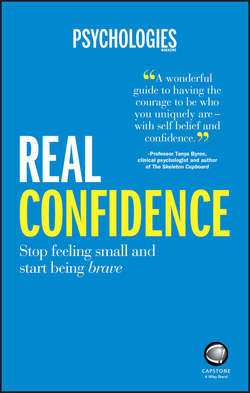Читать книгу Real Confidence - Magazine Psychologies - Страница 6
На сайте Литреса книга снята с продажи.
1
HOW CONFIDENT ARE YOU?
CHAPTER 1
DEFINING CONFIDENCE – IS IT WHAT YOU THINK IT IS?
FINDING A PERSONAL DEFINITION
ОглавлениеSocial psychology studies have shown that we try to manage our feelings of self-worth. With social media, and generations who haven’t experienced life without social media, there is a whole new arena to research. A University of Wisconsin and Madison1 2013 study measuring Facebook users’ self-esteem looked at how quickly participants made positive associations about themselves when looking at their own profile. But the study didn’t look at how and why a Facebook profile is a version of self, or to what extent it’s a true version. If Photoshopped and filtered photos boost your self-esteem, then how real is it? If you’ve posted photos from parties where it looks as though you’re having a fabulous time, but in reality you left early because your ex was there or you were bored, how does looking at photos of yourself looking good help you feel good at the next party or when you’re on your own?
The above study didn’t assess the effect of people looking at other people’s profiles and newsfeeds. One that did was the 2014 study at the University of Queensland’s School of Psychology,2 which found that active participation in social media produces a positive sense of belonging. The study looked at one group of people in which half posted regularly on Facebook while the other half passively observed posts. According to the study, not posting for two days had a negative effect on those who were simply observing the posts. In another group, participants using anonymous accounts were encouraged to respond to each other. However, half of the group were unaware they were set up not to receive any responses. Those who didn’t receive responses felt invisible with lower self-esteem. What does this tell us about self-esteem? That it’s changeable, that it’s vulnerable, that it’s dependent on the group and peer activity? And how does this all tie up with confidence?
If you’re someone who receives compliments about how together you are, if you can be the joker of the group, or if your job involves helping others at a high level, and yet lack of confidence is your guilty secret, then you know all too well that appearances are deceptive. If you can appear to be confident to others but aren’t inside, what does this mean? How can we define confidence to take these contradictions into account?
Enter the academics, with a term we don’t use every day: self-efficacy. In the good old Oxford English Dictionary, efficacy is defined as the ability of something to produce the results that are wanted whilst self-efficacy is the ability to produce a desire or intended result.
Let’s say you want to start going to a yoga class to de-stress. You’ve put it off because you feel hopeless at anything new, you don’t like group activities and you don’t like your body in gym clothes. In short your self-esteem is low. But finally, out of desperation to help you sleep, you go to a low-key class that a neighbour has recommended. Everyone is friendly, no one is in scary designer gear, no one is looking at anyone, you forget yourself and time, and during relaxation you go out like a light, and come round at the end of the class feeling refreshed. You’ve produced your intended result.
If we can change our personal definition of confidence, could that change our view of confidence? If you were totally clear about what confidence is, would it be less elusive and more attainable?
